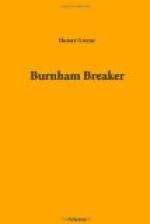“They ain’t no time to make any speech,” he said, backing up against the tree in order to face the assemblage. “We got jest time to ’lect a sec’etary and draw out some res’lutions.”
“I move’t Jimmie Donnelly be sec’etary.”
“I second Jimmie Donnelly.”
“All you who want Jimmie Donnelly for sec’etary, hol’ up your right han’s an’ say yi.”
There was a chorus of yi’s.
“I move’t Ed. Williams be treasher.”
Then the objector rose. “Aw!” he said, “we don’t want no treasher. W’at we want a treasher for? we ain’t goin’ to spen’ no money.”
“You got to have a treasher,” broke in a youthful Gushing, “you got to have one, or less your meetin’ won’t be legal, nor your res’lutions, neither!”
The discussion was ended abruptly by some one seconding the nomination of Ed. Williams, and the motion was immediately put and carried.
“Now,” said another young parliamentarian, “I move’t the chairman pint out a committee of three fellows to write the res’lutions.”
This motion was also seconded, put, and carried, and Ralph designated three boys in the company, one of whom, Joe Foster, had more than an ordinary reputation for learning, as a committee on resolutions; and, while they went down to the breaker office for pen, ink, and paper, the meeting took a recess.
It was, indeed, a task for those three unlearned boys to express in writing, their grief consequent upon the death of their employer, and their sympathy for his living loved ones, but they performed it. There was some discussion concerning a proper form for beginning. One thought they should begin by saying, “Know all men by these presents.”
“But we ain’t got no presents to give ’em,” said another, “an’ if we had it ain’t no time to give any presents.”
Joe Foster had attended the meeting at which the resolutions by the miners were adopted, and after recalling, as nearly as possible, the language in which they were drawn, it was decided to begin:—“We, the breaker boys, of Burnham Breaker, in mass meeting met”—
After that, with the exception of an occasional dispute concerning the spelling of a word, they got on very well, and came, finally, to the end.
“You two write your names on to it,” said Jack Murphy; “I won’t put mine down; two’s enough.”
“Oh! we’ve all got to sign it,” said Joe Foster; “a majoriky ain’t enough to make a paper like this stan’ law.”
“Well, I don’t b’lieve I’ll sign it,” responded Jack; “I don’t like the res’lutions very well, anyway.”
“Why not? they’re jest as you wanted ’em—oh, I know! you can’t write your name.
“Well, I guess I could, maybe, if I wanted to, but I don’t want to; I’m ‘fraid I’d spile the looks o’ the paper. You’s fellows go ahead an’ sign it.”
“I’ll tell you what to do,” said Joe; “I’ll write your name jest as good as I can, an’ then you can put your solemn cross on top of it, an’ that’ll make it jest as legal as it can be got.”




